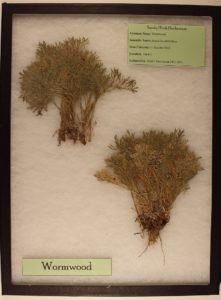 Photo Courtesy of K. Hubeny |
|||||
|---|---|---|---|---|---|
| Common Name(s) | Wormwood | ||||
| Scientific Name | Artemisia absinthium | ||||
| Family | Asteraceae | ||||
| Location/Vegetative Zone | Thicket (MUP) | ||||
| Flowering Period | Early Summer to Early Fall | ||||
| Identifying Characteristics | 3-4 feet high, golden flowers | ||||
Description
- Herbaceous, perennial plant
- Leaves
- Spirally arranged
- Greenish-grey from above, whitish below
- Flowers
- Pale yellow, tubular, and clustered
- Flowers from early summer to early autumn
- Produces a small green fruit
- Odor resembles that of thujone
Medicinal Uses
- Wormwood Oil
- Treat digestive problems
- Applied to wounds and insect bites to reduce pain
- Supplements containing wormwood
-
- Help alleviate symptoms of Crohn’s Disease
- Reduce blood pressure
Cultural Uses
- Principal ingredient in Absinthe, an alcoholic beverage
- Insect repellent
- Oil used to fragrance soaps, perfume, cosmetics, etc.
Sources
“Wormwood”. Web MD. Web MD LLC. N.d. Web
“Wormwood Herb: Health Benefits and Side Effects”. Herbal Resource. N.p. N.d. Web.
1,928 total views, 1 views today
